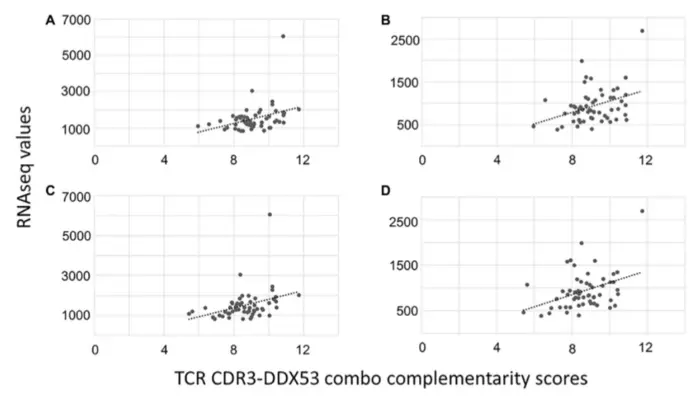“In this ESCA study, the possibility of an immune response that selected for tumor cells lacking the DDX53 CTA is discussed.”

Credit: 2023 Cheng et al.
“In this ESCA study, the possibility of an immune response that selected for tumor cells lacking the DDX53 CTA is discussed.”
BUFFALO, NY- November 17, 2023 – A new research paper was published in Oncoscience (Volume 10) on November 10, 2023, entitled, “An immunoinformatics assessment of the cancer testis antigen, DDX53, as a potential early esophageal cancer antigen.”
T-lymphocytes have been implicated in facilitating a pro-inflammatory, pro-tumorigenic microenvironment that worsens prognosis for esophageal carcinoma (ESCA). In their new study, researchers Peter Cheng, Konrad J. Cios, Mallika Varkhedi, Vayda R. Barker, Michelle Yeagley, Andrea Chobrutskiy, Boris I. Chobrutskiy, and George Blanck from the University of South Florida, Oregon Health and Science University Hospital and H. Lee Moffitt Cancer Center and Research Institute identified tumor resident, T-cell receptor (TCR) complementarity determining region-3 (CDR3) amino acid sequences and employed an algorithm particularly suited to the big data setting to evaluate TCR CDR3-cancer testis antigen (CTA) chemical complementarities.
“To better understand the potential positive and negative impacts of T-cells in ESCA, we recovered TCR recombination reads from the TCGA-ESCA whole exome sequence (WXS) files, obtained the TCR CDR3 AA sequences, and assessed the chemical complementarity of those sequences with CTAs, as those antigens have been characterized by many approaches over decades as candidate cancer antigens.”
Chemical complementarity of the ESCA TCR CDR3s and the cancer testis antigen DDX53 represented a disease-free survival (DFS) distinction, whereby the upper fiftieth percentile complementarity group correlated with worse DFS. The high TCR CDR3-DDX53 complementarity group also represented a greater proportion of tumor samples lacking DDX53 expression. These data and analyses raise the question of whether or not the TCR CDR3-DDX53 chemical complementarity assessment detected an ESCA immune response that selected for DDX53-negative cells.
“Overall, these data are consistent with the possibility that TCR-antigen interaction induces selective pressure that results in antigen loss, a process referred to as immuno-editing [16–18], and, eventually, tumor cell escape from an anti-tumor immune response. These data for ESCA are also consistent with similar data obtained for high CS, low survival in the ovarian cancer setting [19].”
Read the full study: DOI: https://doi.org/10.18632/oncoscience.590
Correspondence to: George Blanck
Email: [email protected]
Keywords: adaptive immune receptor recombinations, complementarity determining region-3, esophageal cancer survival rates, cancer testis antigens
About Oncoscience:
Oncoscience is a peer-reviewed, open-access, traditional journal covering the rapidly growing field of cancer research, especially emergent topics not currently covered by other journals. This journal has a special mission: Freeing oncology from publication cost. It is free for the readers and the authors.
To learn more about Oncoscience, visit Oncoscience.us and connect with us on social media:
- X, formerly known as Twitter
- YouTube
For media inquiries, please contact [email protected].
Oncoscience Journal Office
6666 East Quaker Str., Suite 1D
Orchard Park, NY 14127
Phone: 1-800-922-0957, option 4
###
Journal
Oncoscience
DOI
10.18632/oncoscience.590
Method of Research
Observational study
Subject of Research
People
Article Title
An immunoinformatics assessment of the cancer testis antigen, DDX53, as a potential early esophageal cancer antigen
Article Publication Date
10-Nov-2023



